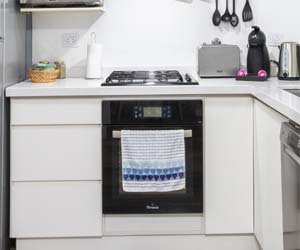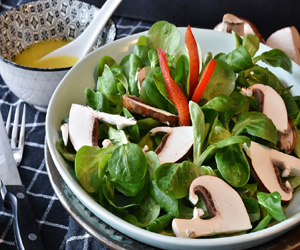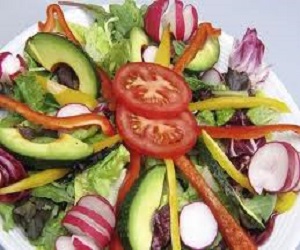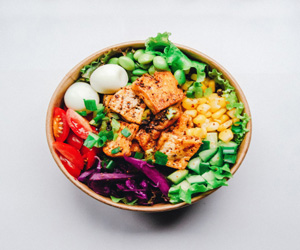


The Key To Stress-Free Cooking

In today's fast-paced world, efficiency is a virtue that extends to every aspect of our lives, including the kitchen. Whether you're a culinary enthusiast or just someone trying to put a nutritious meal on the table, kitchen efficiency can be a game-changer. It saves time, reduces stress, and ultimately enhances your cooking experience.
The Importance Of Kitchen Efficiency
Why does kitchen efficiency matter? In a nutshell, it's the difference between an enjoyable cooking experience and a stressful chore.
Here are a few reasons why it's worth investing in kitchen efficiency:
1. Time-Saving: In our busy lives, time is a precious commodity. An efficient kitchen allows you to prepare meals more quickly, leaving you with more time for other important aspects of your life.
2. Reduces Stress: A cluttered, disorganized kitchen can add unnecessary stress to your meal preparation. Efficiency streamlines the process, so you can enjoy cooking without frustration.
3. Promotes Healthy Eating: When your kitchen is well-organized, you're more likely to make nutritious choices. Access to fresh ingredients and efficient tools can lead to better meal planning.
4. Cost-Effective: An efficient kitchen can help you avoid the temptation of eating out or ordering takeout, saving you money in the long run.
5. Enhances Creativity: A well-organized kitchen can inspire creativity. It encourages experimentation with new ingredients and recipes, leading to exciting culinary discoveries.
Tips For A More Efficient Kitchen
Here are some practical tips to make your kitchen more efficient:
1. Declutter: Start by decluttering your kitchen. Get rid of items you no longer use or need. Keep countertops clear of unnecessary appliances and utensils.
2. Organize Your Pantry: Arrange your pantry so that commonly used ingredients are easily accessible. Use clear containers and labels to help you find what you need quickly.
3. Group Similar Items: Keep pots, pans, and utensils in the same area. Group like items together to minimize searching and save time.
4. Invest In Quality Tools: Good quality kitchen tools can make a world of difference in efficiency. Sharp knives, efficient appliances, and quality cookware can save time and make cooking more enjoyable.
5. Plan And Prep: Plan your meals and prep ingredients in advance. Chop vegetables, measure out ingredients, and have everything ready before you start cooking.
6. Cleaning As You Go: Don't let dishes and utensils pile up. Wash and put away items as you cook to keep the workspace clean and organized.
7. Use Multi-Functional Appliances: Opt for appliances that serve multiple purposes. A blender that can also chop, a rice cooker that doubles as a steamer - these save space and time.
8. Proper Storage: Invest in airtight containers to store leftovers and keep them fresh. Organize your fridge and freezer for easy access.
9. Cook In Batches: Consider making larger batches of meals and freezing portions for later. This can save you time on busy days when you don't feel like cooking from scratch.
10. Maintain Regular Kitchen Maintenance: Keep your kitchen appliances and equipment in good working order. Regular maintenance prevents unexpected breakdowns and disruptions in your cooking routine.
The Rewards Of An Efficient Kitchen
A well-organized and efficient kitchen is the foundation of enjoyable and stress-free cooking. It allows you to make the most of your time, resources, and culinary creativity. By implementing the tips above and maintaining good kitchen habits, you can transform your kitchen into a haven of efficiency, where cooking becomes a joy rather than a chore. So, take the time to declutter, organize, and invest in quality tools - you'll be rewarded with a smoother, more satisfying cooking experience.
Savoring The Culinary Magic
 A Culinary Journey: Delightful dinners often take you on a culinary journey. They can transport you to different parts of the world, allowing you to savor the flavors of exotic cuisines. This culinary exploration is not limited to professional chefs; anyone with a passion for cooking can embark on this adventure. With the right ingredients, recipes, and a dash of curiosity, you can bring the world to your dinner table.
A Culinary Journey: Delightful dinners often take you on a culinary journey. They can transport you to different parts of the world, allowing you to savor the flavors of exotic cuisines. This culinary exploration is not limited to professional chefs; anyone with a passion for cooking can embark on this adventure. With the right ingredients, recipes, and a dash of curiosity, you can bring the world to your dinner table.
The Joy Of Sharing: Delightful dinners are not just about the food but also the company you share them with. Whether it's with family, friends, or that special someone, the act of sharing a meal fosters connection and strengthens bonds. It's a time to catch up, laugh, and create lasting memories.
Delightful dinners are a celebration of the culinary arts, an opportunity to create a dining experience that tantalizes the senses and warms the heart. They can be simple or extravagant, traditional or avant-garde, but what they all have in common is the power to transform an ordinary evening into a remarkable one.
From Uncertainty To Culinary Confidence
 Exploring And Experimenting: As kitchen novices grow in confidence, they naturally gravitate towards exploration and experimentation. Trying out new recipes and different cooking methods becomes an exciting adventure. There's a sense of wonder in discovering how ingredients interact and how flavors meld together. The kitchen evolves from a place of intimidation to one of creative expression.
Exploring And Experimenting: As kitchen novices grow in confidence, they naturally gravitate towards exploration and experimentation. Trying out new recipes and different cooking methods becomes an exciting adventure. There's a sense of wonder in discovering how ingredients interact and how flavors meld together. The kitchen evolves from a place of intimidation to one of creative expression.
Building Culinary Confidence: Culinary confidence is a gradual byproduct of this journey. It's the point where kitchen novices realize that they have not only acquired skills but also developed a passion for cooking. The satisfaction of preparing a delicious meal or mastering a challenging dish is immensely rewarding. Kitchen novices begin to relish the act of cooking and take pride in serving their culinary creations.
The Art Of Satisfying Palates
 The Culinary Playground: The kitchen is a canvas, and tasty creations are the masterpieces. It's a space where culinary artists, from amateur home cooks to seasoned professionals, experiment with flavors, ingredients, and techniques to craft dishes that tantalize the taste buds and ignite the senses. Tasty creations are the result of imagination, innovation, and the passion for food.
The Culinary Playground: The kitchen is a canvas, and tasty creations are the masterpieces. It's a space where culinary artists, from amateur home cooks to seasoned professionals, experiment with flavors, ingredients, and techniques to craft dishes that tantalize the taste buds and ignite the senses. Tasty creations are the result of imagination, innovation, and the passion for food.
Flavorful Alchemy: At the heart of tasty creations lies the art of flavor alchemy. It's about understanding how different ingredients interact, the balance between sweet and savory, the harmony of contrasting textures, and the science behind seasoning. Each dish is a testament to the chef's ability to combine these elements in a way that surprises and delights.
The Delight Of Wholesome Recipes
 Nutrient-Rich Ingredients: Wholesome recipes are characterized by their reliance on nutrient-rich ingredients. Fresh fruits and vegetables, lean proteins, whole grains, and heart-healthy fats take center stage. These ingredients are packed with essential vitamins, minerals, and antioxidants that support our health and well-being.
Nutrient-Rich Ingredients: Wholesome recipes are characterized by their reliance on nutrient-rich ingredients. Fresh fruits and vegetables, lean proteins, whole grains, and heart-healthy fats take center stage. These ingredients are packed with essential vitamins, minerals, and antioxidants that support our health and well-being.
Balanced Nutrition: One of the key features of wholesome recipes is their focus on balanced nutrition. These recipes aim to provide a harmonious blend of macronutrients and micronutrients, ensuring that our bodies receive the fuel they need to function optimally. The balanced approach contributes to sustained energy levels and better overall health.
Simplicity And Freshness: Wholesome recipes embrace the beauty of simplicity. They rely on the natural flavors and textures of ingredients without overcomplicating dishes with excessive additives or processed foods. This simplicity not only makes the recipes easier to prepare but also allows the purity of each ingredient to shine through.
Culinary Creativity: Wholesome recipes are not limited to bland or boring dishes. In fact, they are an opportunity for culinary creativity. Home cooks can experiment with a wide variety of fresh ingredients, herbs, and spices to create meals that are not only delicious but also nutritious.
Nourishing, Efficient, And Satisfying
 Financial Savings: Meal preparation can save money. Eating out at restaurants or ordering takeout can be expensive, and the costs add up over time. Meal preparation allows you to buy ingredients in bulk, plan cost-effective meals, and reduce food waste. It's a budget-friendly approach to dining.
Financial Savings: Meal preparation can save money. Eating out at restaurants or ordering takeout can be expensive, and the costs add up over time. Meal preparation allows you to buy ingredients in bulk, plan cost-effective meals, and reduce food waste. It's a budget-friendly approach to dining.
Reduced Food Waste: Meal preparation encourages thoughtful planning, which can help reduce food waste. You can buy ingredients with specific recipes in mind, use leftovers creatively, and ensure that perishable items are consumed before they go bad. This contributes to a more sustainable and eco-friendly way of eating.
Variety And Convenience: Meal preparation doesn't mean eating the same dish every day. With careful planning, you can enjoy a diverse menu throughout the week. You can also pack ready-to-eat meals for work, travel, or outings, ensuring that you always have a satisfying and nutritious option on hand.
Stress Reduction: Knowing that your meals are ready and waiting can reduce daily stress. You don't have to rush to prepare food after a long day at work, and you won't have to make last-minute decisions about what to eat. Meal preparation brings peace of mind, streamlining your daily routine.
Embracing Simplicity In A Complex World
 Embracing Minimalism: At its core, "back to basics" promotes minimalism. It encourages people to declutter their lives, both physically and mentally. Minimalism is about focusing on what truly matters and eliminating the excess. It's the realization that more possessions, busyness, or complexity do not necessarily lead to greater happiness or fulfillment.
Embracing Minimalism: At its core, "back to basics" promotes minimalism. It encourages people to declutter their lives, both physically and mentally. Minimalism is about focusing on what truly matters and eliminating the excess. It's the realization that more possessions, busyness, or complexity do not necessarily lead to greater happiness or fulfillment.
Simplicity In Daily Living: In a world of constant distractions and information overload, "back to basics" encourages us to simplify our daily routines. This could mean cultivating habits like mindfulness, time management, and gratitude. It's about savoring the present moment, fostering deep connections, and finding joy in life's simple pleasures.
Health And Well-Being: The "back to basics" approach extends to health and well-being. It advocates for a return to whole, unprocessed foods, regular exercise, and stress reduction techniques. Prioritizing a balanced, natural diet and physical activity can lead to improved physical and mental health, reducing the reliance on pharmaceutical interventions.
Striking The Right Balance In Modern Life
 Quality As A Cornerstone
Quality As A Cornerstone
On the other hand, quality is an essential aspect of life that affects our satisfaction and long-term well-being. Whether it's the quality of the food we eat, the products we use, or the relationships we foster, the intrinsic value often trumps the allure of convenience. Quality provides lasting enjoyment and a sense of fulfillment.
The Food Conundrum
One area where convenience vs. quality is palpable is in our food choices. Fast food and processed meals are convenient and quick, but they often lack the nutritional value and flavors of freshly prepared, high-quality ingredients. Overindulging in convenience foods can lead to health problems, while a commitment to quality, fresh, and unprocessed foods can promote well-being and a better relationship with what we eat.
Balancing Act
Striking the right balance between convenience and quality is the key to navigating the challenges of modern life successfully. It involves making conscious choices that prioritize quality without sacrificing convenience entirely. Here's how: